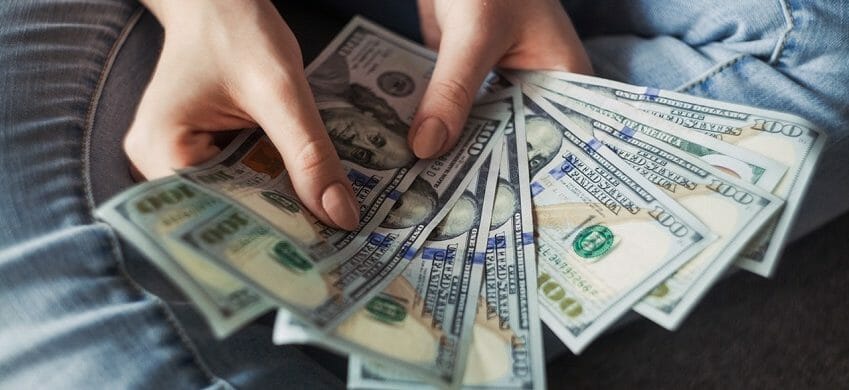Last Updated: March 19, 2024
Pay Off Debt or Save Money?

Disclaimer: We are not qualified legal or tax professionals and are not giving advice. Always speak with a qualified professional before making any legal or financial decisions.
Caught in the balancing act between paying down debt and bolstering your savings? You're not alone.
In this comprehensive guide, we dissect the age-old debate of whether to allocate funds towards debt repayment or savings, equipping you with the insights needed to navigate this financial crossroad with confidence.
If you want to avoid reading the article and speak to a debt specialist. Click here for a
free consultation.
Create a Budget
The first step to saving money and paying down debt is analyzing your monthly expenses and creating a budget. Add up all of your monthly necessary expenses like housing, transportation, food, utilities, etc.
Then look at where you overspend each month in categories like dining out, entertainment, shopping, etc. Finding areas to cut back spending is crucial to freeing up more money to put towards debt payments and savings each month.
There are many free budget templates and tools available online to help track your spending. Try to find an extra $100-500 in your monthly budget that can be redirected towards financial goals. Every bit helps when trying to pay off debt or bulk up savings.
Pay Off Debt
If you focus on paying down your debt first, you are decreasing how much you pay in interest and potential penalties like late fees. The problem is that when something inevitable happens – your car breaks down, you get sick, that sort of thing – you’ll likely fall back on your credit card instead of your savings account and add more debt.
Check out our debt calculator to find out how much interest you’ll pay on your credit card balances.
Save Money
The good side of this is that you have money in your savings. The bad side is that you have more debt and have been potentially paying a lot of interest charges. You may even approach retirement with debt, which can mean more working and budgeting with less relaxation.
Find out more about having debt when you retire. Read our article Thinking about retirement? Get a handle on your debt first!
Debt Consolidation
Debt consolidation involves rolling multiple debts into one new loan with a lower interest rate. This allows you to save money on interest charges each month and potentially get out of debt faster. Two main types of debt consolidation loans are balance transfer credit cards and personal loans.
Make sure to shop around for the best rate and read the fine print before choosing a debt consolidation method. Debt consolidation can help simplify payments to one monthly bill while paying debt off aggressively. Just be sure the terms make sense for your situation.
When to Pay off Debt First
If you have a lot of high-interest credit cards, focus on paying them down. Look for lower-interest credit cards with balance transfer options. Hint: read the fine print to make sure it is a good deal. You can consolidate your credit card bills by getting a lower-interest loan.
When to Put Savings Goals First
If you do not have high-interest loans, you can focus on saving up to $1000 first and then start saving three to six months' worth of expenses. You can use this money to cover those unexpected events like car repair bills, instead of running up more credit card debt. Once you have this savings built up, you can then pay off your debt and start saving for retirement.
Using a 401K to Pay off Debt
If you are fortunate enough to have a 401K, should you cash out your 401K to pay off debt? The short answer, possibly. Since you will pay income tax on the withdrawal and incur additional tax penalties, it probably only makes sense to pull out 401K funds if your debt interest rate is greater than 18 or 20%. You should talk to a financial advisor before you take this step.
Using Savings to Pay Off Debt
If you have savings, should you use it to pay down debt? Yes, but do not drain your savings. Instead, try to keep at least 6 months of expenses in your savings account. Use the rest to strategically pay off your debt. Either pay off the highest-interest debt first or pay off smaller debts. We discuss some techniques to start saving money in “How to get out of debt in 2020.”
How to Save Money While Paying Off Debt
The blended technique — saving money and paying off debt — offers the best of both worlds. Set a reasonable savings goal — usually $1000, cut expenses, and live on a very strict budget. Then put half of any extra money into savings while you use the other half to pay down debt. The biggest secret is to not run up more debt while you are paying down your existing debt.
What if I Can’t Pay Down My Debt?
If you are unable to make even the minimum payments and putting aside savings is a distant dream, there is still help available for debt relief. You may benefit from credit counseling, debt consolidation, or debt settlement. Each option has drawbacks and each has benefits. Pacific Debt Inc. consultants will explain your options to you and help you find the best solution for your unique situation. Your initial consultation is free.
Side Hustles and Extra Income
Taking on a side gig is a great way to bring in extra money that can be used solely for debt payments or savings contributions. Options like rideshare driving, tutoring, freelance writing, selling arts/crafts online, renting out a room on Airbnb, and dozens more allow you to work around your schedule.
Even an extra $200-500 a month from a side hustle can make a big impact on your financial goals. Consider your skills, interests, and schedule flexibility when choosing a money-making side hustle. Tap into the gig economy as much or as little as works for your lifestyle.
FAQs
Conclusion
Deciding whether to prioritize debt repayment or saving comes down to your financial situation. Generally, having some emergency savings should come before aggressive debt payoff. Once you've built up 3-6 months of expenses, you can shift focus to wiping out high-interest debts using strategies like debt consolidation or settlement.
Finding room in your budget for both savings contributions and extra debt payments each month is ideal. Consider supplemental income streams to generate more money. And make sure you aren't adding to existing debts going forward. With a balanced approach, savvy money management, and discipline, you can simultaneously save and become debt-free.
Pacific Debt, Inc.
Pacific Debt Inc. is one of the leading debt settlement companies in the US. We help you understand your options and whether or not debt settlement is your best option. If it is not, we will refer you to a trusted partner who may be more appropriate for your financial situation.
If you’d like more information on debt settlement or have more than $10,000 in credit card debt that you can’t repay, contact Pacific Debt, Inc. We may be able to help you become debt-free in 2 to 4 years and we’ve settled over $300 million in debt for our customers since 2002.
Once you’ve completed our debt settlement program, your financial situation should start to improve. You’ll then be able to take the money you once had to pay towards your debt and be able to use it for other purposes like saving, investing, retirement, etc.
Pacific Debt, Inc. is accredited and an A+ member of the Better Business Bureau. We rate very highly in Top Consumer Reviews, Top Ten Reviews, Consumers Advocate, Consumer Affairs, Trust Pilot, and US News and World Report.
Pacific Debt is currently providing debt relief coverage in the following states:
Alabama, Alaska, Arizona, Arkansas, California, Colorado, District of Columbia, Florida, Idaho, Indiana, Kentucky, Louisiana, Massachusetts, Maryland, Michigan, Minnesota, Missouri, Mississippi, Montana, North Carolina, Nebraska, New Mexico, New York, Oklahoma, Pennsylvania, South Dakota, Texas, Utah, Virginia, Wisconsin
* Other states can be connected to one of our trusted partners
For more information, contact one of our debt specialists today. The initial consultation is free, and our debt experts will explain to you all your options.
*Disclaimer: Pacific Debt Relief explicitly states that it is not a credit repair organization, and its program does not aim to improve individuals' credit scores. The information provided here is intended solely for educational purposes, aiding consumers in making informed decisions regarding credit and debt matters. The content does not constitute legal or financial advice. Pacific Debt Relief strongly advises individuals to seek the counsel of qualified professionals before undertaking any legal or financial actions.
✔ Accredited by Better Business Bureau with BBB A+ rating (4.93 rating and 1678 reviews)
✔ US News and World Reports and Bankrate ranked Pacific Debt Relief as one of “The Best Debt Relief Companies of 2024”
✔ 6.9 star rating by BestCompany.com (over 2379 client reviews)
✔ 4.8 star rating by TrustPilot based (over 1613 verified consumer reviews)
✔ ConsumerAffairs.com Accredited (over 544 verified reviews with an average rating of 5 stars)
✔ A Top 10 Rated Compan by TopTenReviews.com , ConsumersAdvocate.com and Top10debtconsolidation.com
✔ 4.6 star rating by Google (229 client reviews)
✔ 100% rating by SuperMoney (9 client reviews)
Reduce Your Credit Card Debt By Up to Half

BBB Reviews | 4.9/5.0 Rating









 Do Not Sell My Personal Information
Do Not Sell My Personal Information